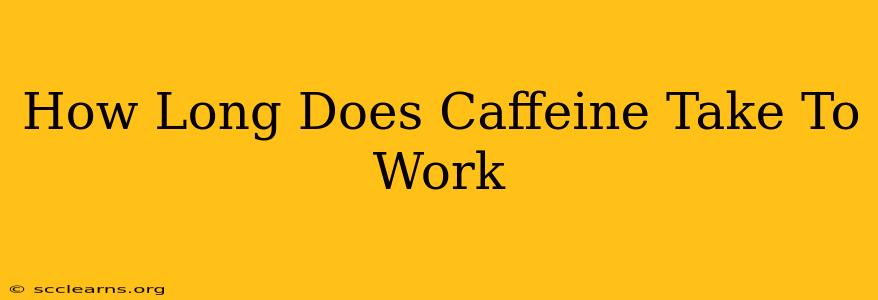Feeling tired and reaching for that coffee? You're not alone! Millions rely on caffeine for that much-needed energy boost, but understanding how long it takes to work can help you optimize its effects. This comprehensive guide explores the timeline of caffeine's impact on your body, along with factors influencing its onset and duration.
The Speed of Caffeine: A Timeline
The time it takes for caffeine to take effect depends on several individual factors (more on those below!), but generally, you can expect to feel its effects within 15 to 45 minutes of consumption. This isn't a precise science; some might feel energized sooner, while others might experience a slightly delayed effect.
Here's a breakdown:
- 15-30 minutes: For many, this is the sweet spot. You'll start to feel the subtle effects – increased alertness, improved focus, and a reduction in fatigue.
- 30-45 minutes: The peak effects of caffeine are generally felt within this timeframe. This is when you'll experience the most significant boost in energy and cognitive function.
- Beyond 45 minutes: The effects of caffeine will gradually plateau and begin to decline, depending on factors such as metabolism, dosage, and tolerance.
What Influences Caffeine's Onset?
Several factors influence how quickly caffeine kicks in:
- Method of Consumption: Caffeine absorbed more quickly when consumed in liquid form (coffee, tea) compared to solid forms (chocolate, certain medications). Espresso, due to its concentrated form and rapid absorption, often produces a quicker effect than drip coffee.
- Dosage: A higher dose of caffeine will generally produce a quicker and more noticeable effect, however, consuming excessive amounts isn't recommended. Always adhere to recommended daily limits.
- Metabolism: Your body's metabolism plays a significant role. Individuals with faster metabolisms process caffeine more quickly, meaning they may feel the effects sooner but also experience a shorter duration of effect.
- Food Intake: Consuming caffeine on an empty stomach generally leads to a faster absorption rate compared to when consumed with food, which slows down the absorption process.
- Individual Sensitivity: Tolerance to caffeine varies significantly between individuals. Those with a higher tolerance may require a larger dose to achieve the same level of stimulation, while individuals sensitive to caffeine may experience effects more quickly, even with smaller amounts. Always start with smaller doses and gradually increase if needed.
- Health Conditions: Certain pre-existing health conditions might influence how your body metabolizes caffeine. If you have concerns, speak to your doctor.
Maximizing Caffeine's Benefits
To get the most out of your caffeine intake, consider:
- Timing: Avoid consuming caffeine too late in the day, as it can interfere with sleep.
- Hydration: Drink plenty of water alongside caffeinated beverages to stay hydrated.
- Balanced Diet: Pair your caffeine intake with a healthy diet to support optimal energy levels.
- Listen to Your Body: Pay attention to how your body reacts to caffeine and adjust your intake accordingly.
When to See a Doctor
While caffeine is generally safe for most adults in moderate amounts, excessive consumption can lead to adverse effects such as anxiety, insomnia, and digestive problems. If you experience any concerning symptoms, consult a doctor.
This article provides general information and should not be considered medical advice. Always consult a healthcare professional before making any significant changes to your diet or lifestyle.

